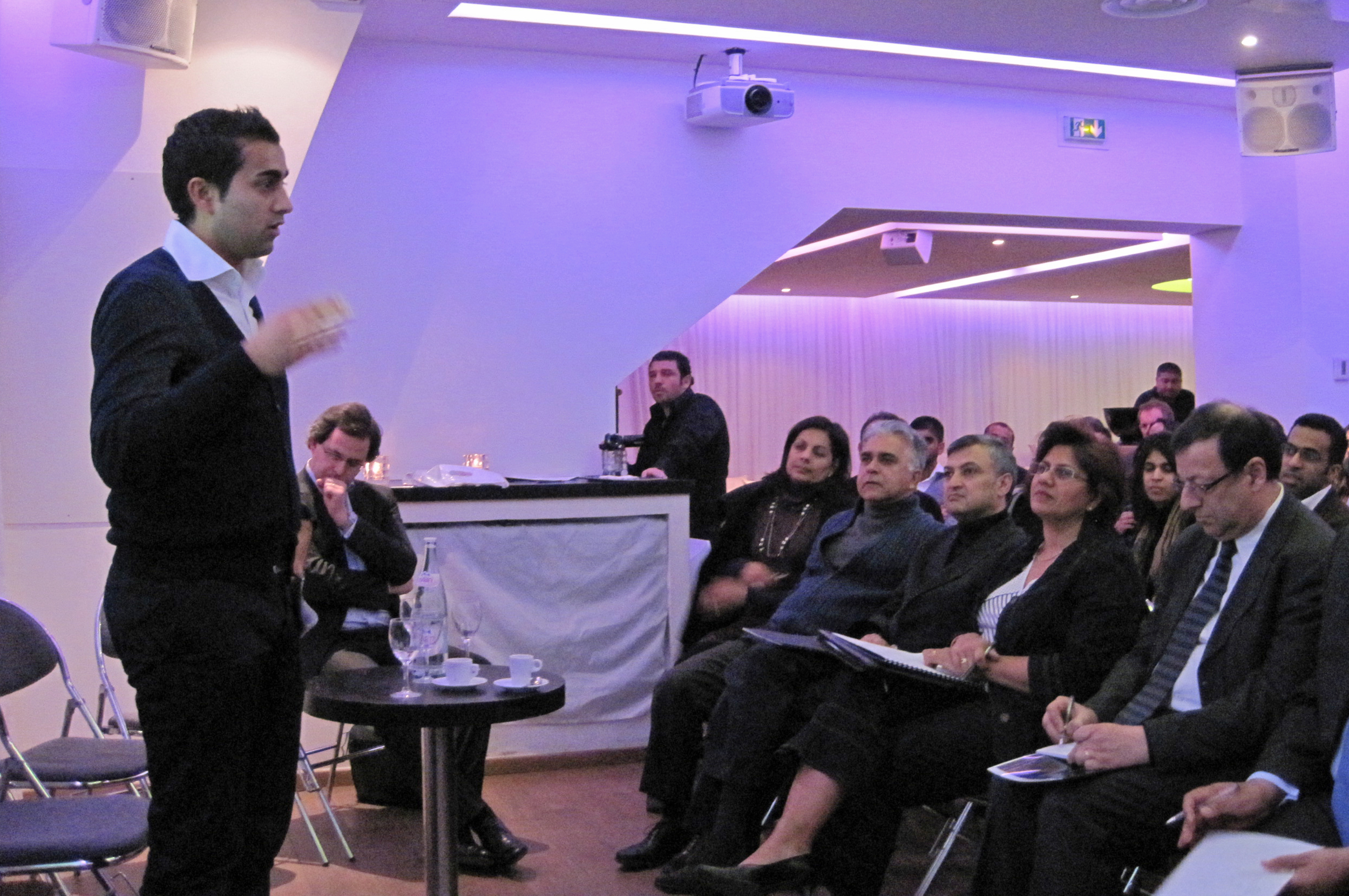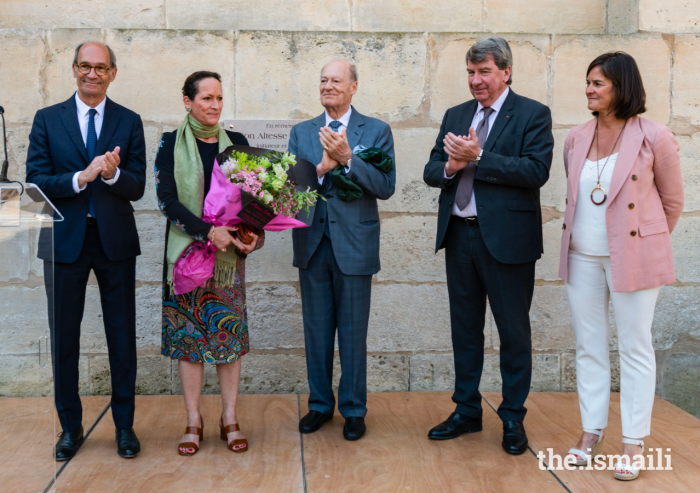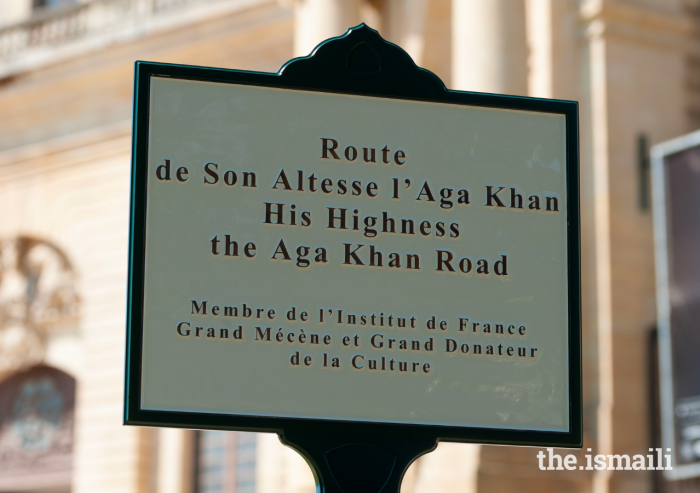The signposts of the global economy look bleak.
In the Western world, debt has piled up – governments and families alike are overextended. Developing world countries, accustomed to years of double-digit growth, are having to adapt to a much slower economic pace. The International Monetary Fund's forecast for this year and next projects that emerging economies will grow at 6 per cent, while the richer economies will advance at a meagre 2 per cent or less.
In the Euro area, where general unemployment was 10 per cent in July and as high as 25 per cent among the youth, the Ismaili Council for France sees the economic resilience of the Jamat as a key priority. Through various initiatives of the Aga Khan Economic Planning Board (EPB), it has been on a mission to improve employability and enhance professional opportunities for the Jamat within its jurisdiction, which includes France, Belgium, Switzerland and Côte d'Ivoire.
 Professionals and Jamati members share their experience at a franchise business seminar in Paris organised by the EPB for France. Courtesy of the Ismaili Council for France
Professionals and Jamati members share their experience at a franchise business seminar in Paris organised by the EPB for France. Courtesy of the Ismaili Council for FranceIn 2010, the Economic Planning Board launched a support programme called the Career Management Service (CMS) to support individuals seeking employment as well as those who are going through professional transition. The service offers workshops on setting goals, resume building and job hunting techniques, and is supported by professionals within the Jamat as well as external resources. It also seeks to support entrepreneurial aspirations.
“What started off as something I would like to be doing for enjoyment, and in many ways a pipe dream, has turned into a business idea and possible career path,” says Karim, who was at first torn between pursuing a risky entrepreneurial dream or finding a job that offered a measure of income security. “Since talking to CMS, I have been looking at my career with a different mindset,” he says.
The EPB established an entrepreneurial network to boost entrepreneurship in the Jamat and offer support to those seeking to establish their own businesses. This gave Karim a chance to have the best of both worlds: “I managed to secure a full-time job in property with an organisation that also partners with entrepreneurs,” he says.
The CMS team received professional training on effective job search techniques, so that they could tailor their service to the needs of each individual. “Our philosophy is to support people in finding the job – not to find jobs for them,” says Economic Planning Board Chairman Shamir Samdjee. “Meritocracy needs to influence the choice and attitude towards employability. After all, each individual is the author of their own ambition and destiny.”
“The CMS goes beyond simple advice,” says Richma, who sought help to establish a career in microfinance. “It is interested in what really drives you, and highlights your strengths.” Through the service, she received information specific to her needs and ambitions, and learnt how to embark on an effective job search.
“The CMS showed me how to build my own network in my area of interest,” she says. “Within two months, I got more interviews with microfinance professionals than I had from responding to advertisements.”
According to the EPB, more than 75 per cent of those who have engaged the services of the CMS have found a job in their field of choice. “Some have changed the area they wanted to work in,” says Samdjee. “Some have started further studies in their new field of interest.”
An accountant by training, Shams was looking for a career change when she approached the CMS. “I attended three days of training, which gave me confidence, and I also gained the support of others in the team – trainers and other candidates.”
 The Mayor of Argenteuil, Philippe Doucet, and the Deputy Mayor take part in the opening of a new business by two Ismaili families, who received advice and support through a programme organised by the Aga Khan Economic Planning Board for France. Courtesy of the Ismaili Council for France
The Mayor of Argenteuil, Philippe Doucet, and the Deputy Mayor take part in the opening of a new business by two Ismaili families, who received advice and support through a programme organised by the Aga Khan Economic Planning Board for France. Courtesy of the Ismaili Council for FranceIn the case of two Jamati families who were interested in setting up franchise businesses, the EPB paired them with mentors from the Jamat who already had franchise expertise. Together with the new business owners they reached out to the Mairie d'Argenteuil – the Local Authority – to secure financial help, a storefront on the main commercial street, and administrative advice and support. The Mayor even attended the opening ceremony of their store.
“The Argenteuil Local Authority was so impressed, that they asked us to participate in the development of their commercial City Centre,” says EPB Chairman Shamir Samdjee. “We have started working closely with them and are willing to create a partnership which could enable, for example, to teach French to some of our Central Asian community members, or to identify opportunities for members looking for jobs in this area.”
The Economic Planning Board is encouraged by their early successes, but acknowledge that they have only scratched the surface of what can be done to address employability, and that challenges still remain to make their system sustainable. Moving forward, they are exploring future professional trends, international opportunities and the role of civil society, whose future development they feel will make it a bigger employer in the years ahead.
In the face of an ailing global economy, the Aga Khan Economic Planning Board for France is spreading an abundance of what is perhaps the most important form of capital today: hope and an enterprising spirit.







